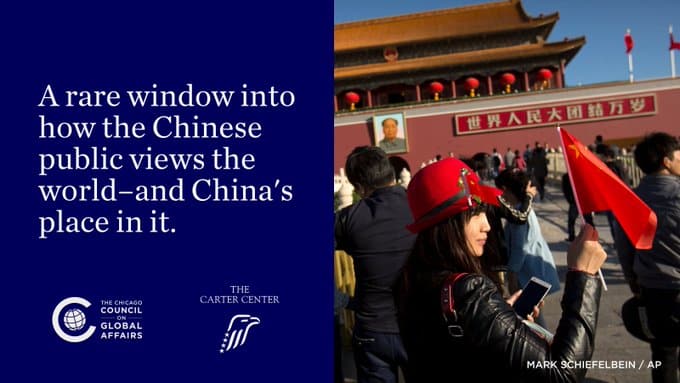The Role of Business and Trade in U.S.-China Cooperation
By Kathryn Putz
Editorial Note: Check out our latest report, “Finding Firmer Ground: The Role of Civil Society and NGOs in U.S.-China Relations,” with a foreword by President Carter. The report looks at how civil society engagement can create a new approach to U.S.-China relations. Click here to read.
On February 18th, 2021, The Carter Center, in conjunction with the World Trade Center Association and the China Research Center in Atlanta, organized a webinar titled “U.S.-China Relations: New Challenges, New Opportunities.” The forum featured four prominent speakers, each of whom addressed a significant issue confronting the bilateral relationship between the U.S. and China. The senior advisor on China at the Carter Center, Dr. Yawei Liu, framed the event, saying, “To say engagement is a failure is historically wrong, factually nonsense, and politically blind…as long as the U.S. and China stay engaged, there will be peace.”
To begin, Frank Neville, former U.S. diplomat and senior vice president of the Georgia Institute of Technology, offered a keynote speech. Neville began by articulating the growing importance of engagement with China, despite growing concerns from various U.S. interest groups.U.S. businesses, for instance, are frustrated by the lack of market access and “not being on a level playing field with China.” Similarly, U.S. workers are concerned about lost jobs domestically due to Chinese exports. Additionally, human rights groups are troubled by the abuses occurring in Hong Kong and Xinjiang. Finally, national security advisors are concerned about military advances in Taiwan and the South China Sea.
Following his opening remarks–which painted a negative picture of bilateral cooperation–Neville provided a series of concrete steps he believes will foster engagement between the U.S. and China. The ultimate goal, he argued, is for the U.S. to find an acceptable role for China in the world order. To achieve this, Neville argued that bolstering the U.S. domestic environment is a crucial first step. Domestic strength, Neville argued, finds its roots in rebuilding alliances with like-minded allies and living up to American values such as freedom and democracy. In addition, Neville stressed the importance of “competing hard where U.S. interests are at stake.” Through government investment in research, education, healthcare, and inequality, he argued that the U.S. can regain a competitive edge in key areas such as technology. Thus, Neville set a cautiously optimistic tone for the event, saying he was “grounded in hope for the future but also cognizant of reality and the challenges currently facing us.”
Next, Ker Gibbs, president of the U.S. Chamber of Commerce in Shanghai, provided insight into American corporations in China. On the topic of U.S. policies towards China, Gibbs was confident in the future of American businesses in China under the Biden administration. Gibbs recommended that Biden’s trade policies–which will likely seek to put the American worker first–should include a “robust footprint” for American businesses in China. Revenue expansion and profitability of U.S. businesses in China, he argued, will support the growth of the branches at home.
Following Gibbs’ remarks, Scott Wang, vice president of the World Trade Center Association, elaborated on the promising future of the bilateral trade relationship. Namely, Wang asserted that China has shown an increased willingness to negotiate and discuss challenging trade issues–making trade one of the core areas for bilateral cooperation. More specifically, China has recently made headway in multilateral trade agreements, renewing its interest in both the Comprehensive and Progressive Agreement for Trans-Pacific Partnership (CPTPP) and the U.S.-China Phase 1 Trade Agreement.
To conclude the event, Bing Xie, former senior vice president of Texas Instruments, warned of the consequences of technological decoupling. Xie clarified that while China has been steadily completing its long-term plan for innovation growth, the U.S. remains the global leader in innovation and technology. Because of the preeminence of both countries in the field, Xie reiterated the importance of bilateral cooperation on issues of business and trade, saying “decoupling is not a feasible option.”
In summary, the speakers of the “U.S.-China Relations: New Challenges, New Opportunities” were optimistic about the ability for business and trade to facilitate cooperation and provided a series of important takeaways. Firstly, dropping the “false dichotomy”–which demands ideological change in China as a precursor to cooperation–will promote more frequent negotiations between the two countries. Secondly, the success of the Chinese economy and U.S. businesses in China will encourage business growth in the U.S. Additionally, tighter U.S.-China trade partnerships may lead to closer communication on more controversial issues such as national security and human rights. Finally, technological decoupling between the two nations should not be considered as a viable alternative.
Click here to access the Youtube recording of the webinar.
Readers from China: Click here to access the recording of the webinar.








